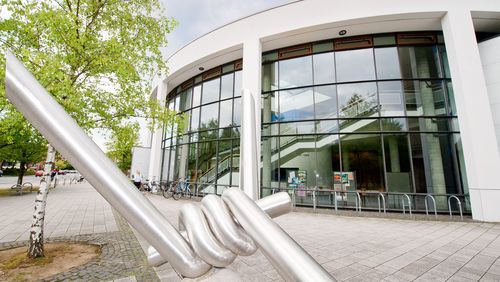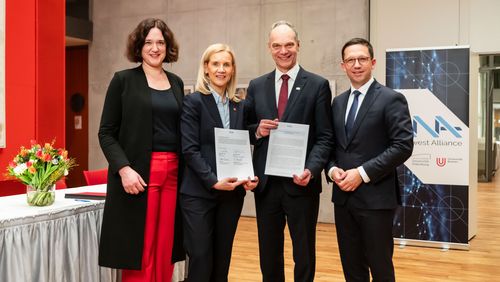Individualised and online-based is how Professor Dr. Anke Hanft, scientific director of the University of Oldenburg's Centre for Lifelong Learning (C3L) sees the future of academic teaching and continuing education. The expert in continuing education and university management talks in an interview about why changes in the working life are also affecting universities.
QUESTION: This year the Federal Ministry of Education and Research's "Science Year" revolves around the working life of the future. What part do academic education and continuing education play in the changes our working life is undergoing?
HANFT: Jobs cannot be considered separately from the new technologies, and the world of employment is changing rapidly. We must therefore be far more consistent in combining work with continuing education. We can no longer rely on learning processes being concluded once we complete our vocational training or studies. In an aging society in particular, we must ensure that learning continues throughout our lives. Companies are already putting this into practice; in the last few decades they have invested intensively in human resources development. But at universities too, the pressure is growing to change study models that up to now have focussed exclusively on learning for younger people.
QUESTION: What status does continuing education have at German universities?
HANFT: A few years ago we carried out a large-scale international comparative study on continuing education for the Federal Ministry of Education and Research. It showed that at German universities the prevailing concept of continuing education after university studies corresponds to just a small proportion of the interchange between professional training and higher education that exists in the USA in particular, but also in Scandinavia. In Germany we have two well-developed pillars – university education and vocational education. In an increasingly demanding working world it is vital to strengthen the connection between these two pillars. Countries like the USA, which don't have a well-developed vocational education system like that in Germany, demonstrate how the process of qualifying people for practically orientated areas can be far more integrated into university education. In this way we can take a more system-integrated approach to knowledge transfer issues and establish it at universities. Continuing education is an important driving force for transfer in this process.
QUESTION: That means higher education and the working world should be more closely linked...
HANFT: Exactly. We must not make the mistake at our universities of focussing solely on research and science and neglecting teaching and knowledge transfer. Strengthening the links between both elements is one of the tasks of continuing education. We are trying to achieve this among other things by redesigning our learning processes, for example by having students work on projects in which they learn about professional practice under academic supervision. In this way our researchers also gain an entirely different perspective on how knowledge is applied. We cooperate closely with the Fraunhofer Society, which pays great attention to knowledge transfer. In the summer we will start a first joint certification programme: in the Diploma of Advanced Studies (DAS) in Research and Transfer Management programme we want to teach scientists how to better convey the results of their research.
QUESTION: Who will study at universities in the future?
HANFT: With over 50 percent of the people in a one-year age group leaving school with the higher education entrance qualification ("Abitur"), our student body is becoming increasingly heterogeneous and students are opting to start their studies at a later stage. In addition, the proportion of students who earn a Bachelor's degree and then gather professional experience over a few years before starting a Master's degree is growing. They come with a very different skill set than the 18-year-olds. So for example in our teaching training programmes there are many educators who didn't begin their studies until they were 30 or 40. Yet we still plan our courses based on the premise that with the Abitur everyone has the same entry qualifications. This, however, doesn't always guarantee successful studies. Many universities are therefore intensifying their efforts to homogenise heterogeneous students by trying to balance out deficits in school education. But apart from the fact that such measures are highly controversial: we wanted to focus on the fact that some students may have more skills than those required at the start of their studies. We are therefore calling for university structures to be better adapted to the growing individuality of the students. What skills do students already have? What might they be lacking to successfully complete a degree programme? What skills do they have that normal students don't have? Can we grant them credit points for previous professional experience or qualifications? Compared to other universities, the University of Oldenburg has already made considerable progress in this respect.
QUESTION: So what does this mean in concrete terms for teaching?
HANFT: The credit point system makes it possible to create online-based learning units in such a way that participants can put their modules together individually in order to earn the exact qualification they need. In this respect the Bologna Process has also become a driving force for lifelong learning. For example, we work with very small units, learning nuggets, that can be integrated into modules and that facilitate different forms of deeper and continued learning. We need to anchor this individualised learning process that uses individual learning paths more firmly in the university institutions – and complement it with standards and quality assurance mechanisms. In this respect too, the University of Oldenburg is already considerably ahead: our credit transfer procedures for skills acquired outside higher education are regarded as exemplary. Many universities benefit from the results of our research and experiences. We coordinate the research that forms part of the Teaching Quality Pact ("Qualitätspakt Lehre") – a programme run by the Federal Ministry for Education and Research which provides funding for over 150 universities. And we are also involved in the scientific supervision of the Federal and Federal State competition "Advancement Through Education: Open Universities” ("Aufstieg durch Bildung: Offene Hochschulen"), which provides funding to around 100 universities.
QUESTION: So the oft-cited digitalisation is also an important topic here...
HANFT: Yes, we started implementing online methods of learning at an early stage. At the C3L we have a department dedicated solely to the pedagogical and didactic integration of learning technologies. We are regarded as a leading institution in the area of continuing learning in this field. However, we need to further integrate our university education and online learning methods – and increasingly incorporate this into undergraduate studies. Speaking in slightly exaggerated terms, one could say that we don't really need lectures anymore. I can learn on the basis of study materials and get assistance and feedback from my mentor. I don't need to do this in big lecture halls anymore. Lectures and seminars that require the student's physical presence can be better used for interactive forms of learning.
QUESTION: The Federal Minister of Education Anja Karlizcek said at her inauguration ceremony that she wanted to make continuing education available to as many people as possible. You would no doubt subscribe to that?
HANFT: What is important to me in this discussion: With more than 50 percent of the persons in a one-year age group leaving school with the Abitur, we need to recognise that students are entering our system with widely varying qualifications and interests. Thus, we must ask ourselves: what do we want university education to mean in the future? Do we want education to be for a small elite that sees its professional future in research? If so, the universities of applied sciences need to be developed, and they need to heighten their profile as institutions that provide a work-orientated university education. The universities and the universities of applied sciences both need to confront the changed reality and definitely concentrate more on the transfer of knowledge. Continuing education is an important tool for this. These are central university and education policy issues that we must address.
Interview: Constanze Böttcher




